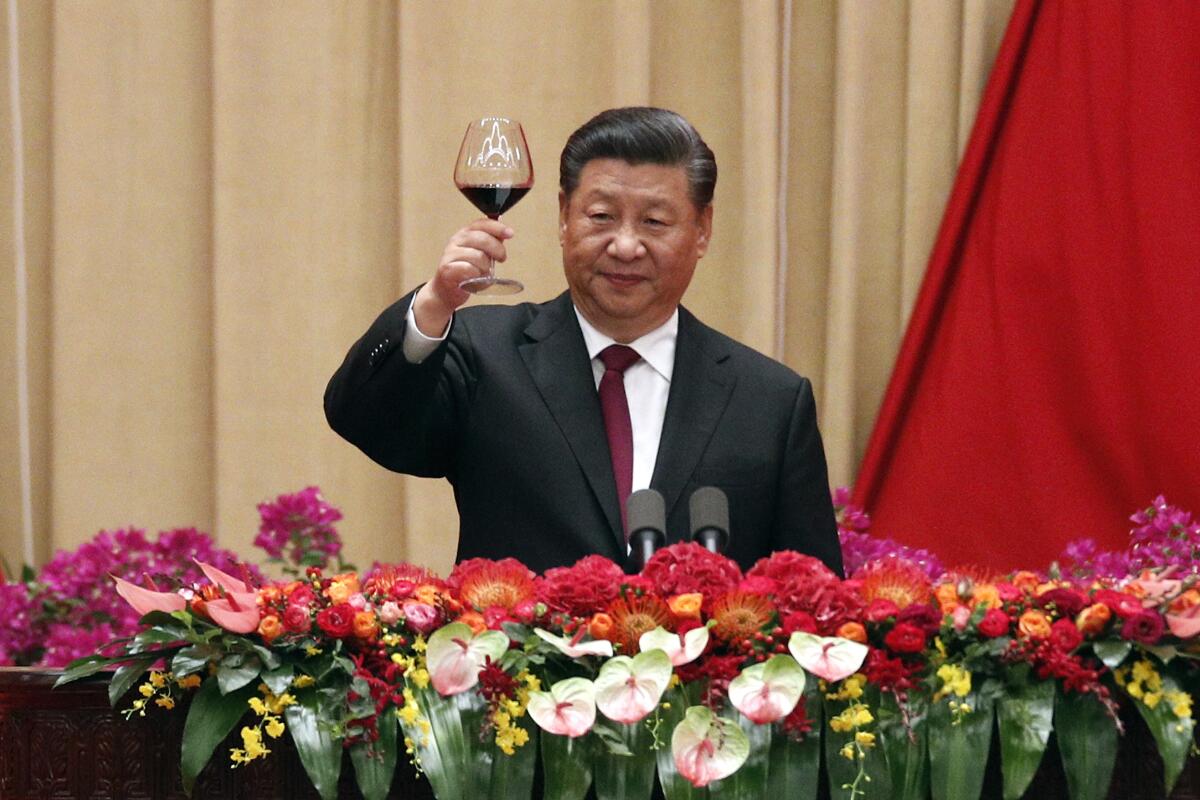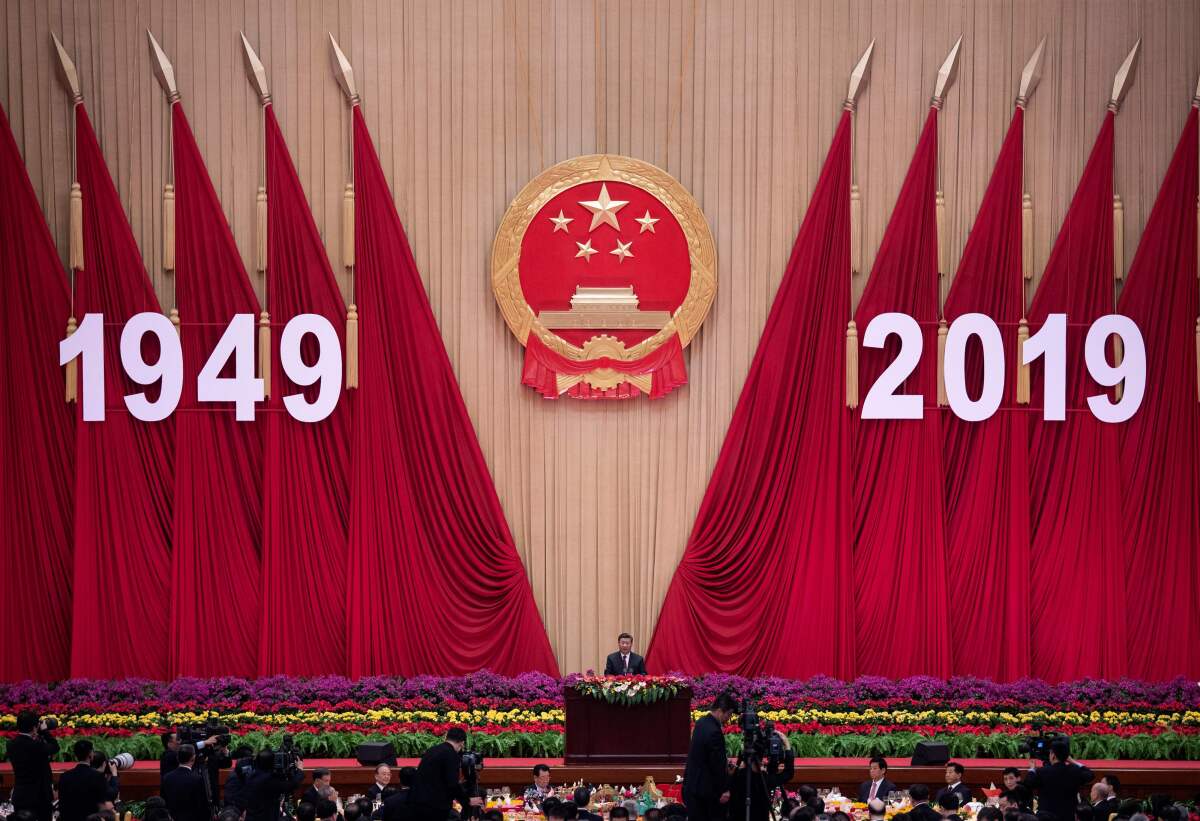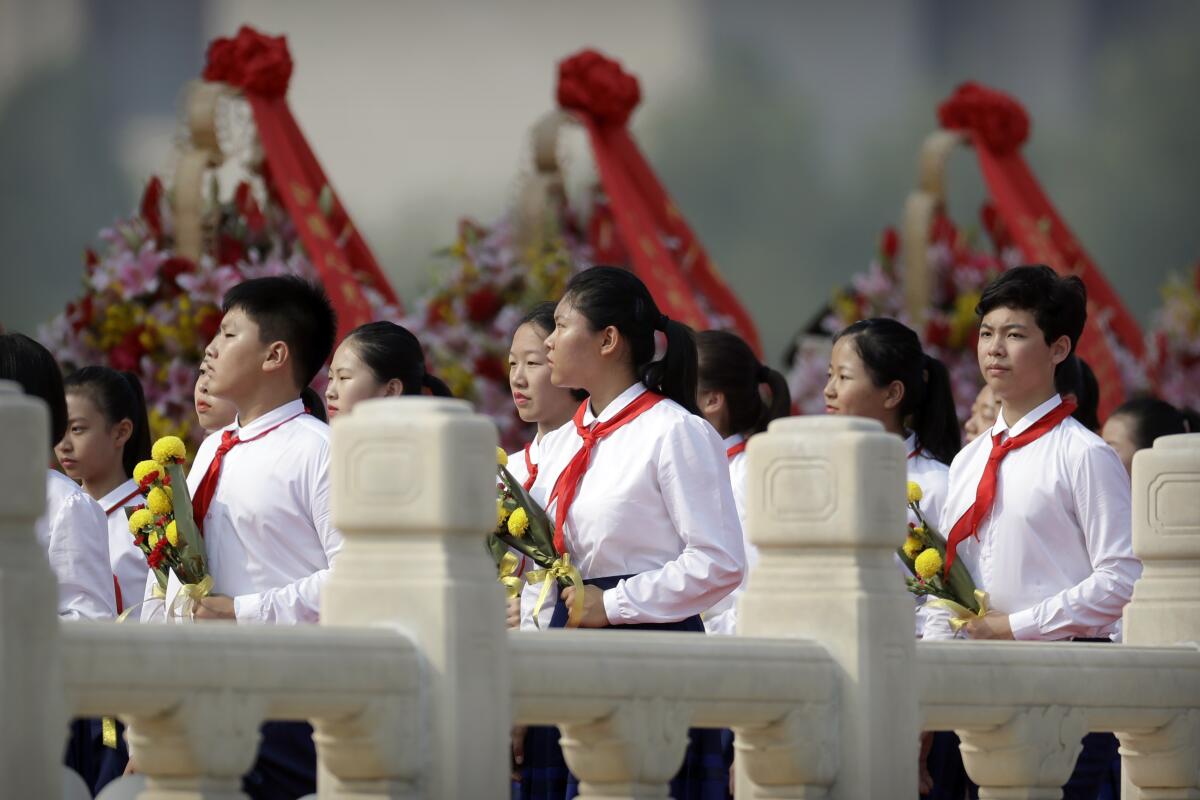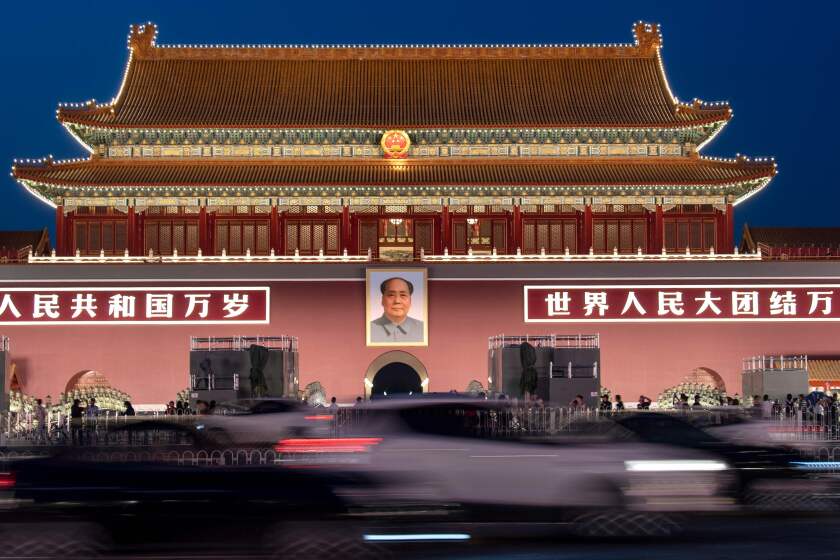With cannon blasts in Tiananmen Square, communist China kicks off the 70th anniversary of its founding

BEIJING — Fifty-six cannons fired 70 times shattered the silence in Tiananmen Square on Tuesday as a formation of soldiers goose-stepped forward to raise the national flag.
Beijing’s sky was smoggy as President Xi Jinping and other Chinese leaders took their places on the podium at precisely 10 a.m. The hour had come to celebrate the 70th anniversary of the founding of the People’s Republic of China.
As thousands of people rapturously waved Chinese flags, Xi opened his speech by telling the crowd that Chinese people all over the world were filled with joy, happiness and pride at the communist nation’s founding.
“It was 70 years ago today that Chairman Mao stood at this very place and announced solemnly to the world the founding of the People’s Republic of China, which marks an end to more than 100 years of humiliation and suffering,” Xi said.
He said the Chinese people had managed to stand on their feet and make great strides.
“There’s no force that can shake the foundations of this great nation. No force can stop the Chinese people and the Chinese nation forging ahead!” he declared.
He called for the Chinese people to be more united.
“China’s yesterday is already engraved in the history of mankind. China today is created by hundreds of millions of hardworking Chinese and China’s tomorrow will be even more prosperous! Long live the great People’s Republic of China! Long live the great Communist Party of China! Long live the great Chinese people!”
Xi then carried out his inspection of military troops in an open-topped Hongqi limousine.
As he traveled along Changan Avenue, he greeted soldiers, “Hello, comrades!” and each formation shouted in unison, “Hello, President!”
On Monday, the No. 1 rule for members of the media attending a grand banquet at the Great Hall of the People on the eve of the 70th anniversary of the People’s Republic of China was: “Do not interview the guests.”
The only words to be reported at the vast banquet Monday evening were those of Xi, who has carefully carved out a cult of personality in recent years. He declared that China had caught up “in great strides” and was now leading the world.
“We are now marching at the forefront of the times, with boundless energy!” said Xi. “Over the last 70 years — with perseverance and strenuous efforts — the Chinese people have impressed the world with their achievements.”
Tuesday’s parade was designed to send a confident message that China’s military has modernized rapidly, amassing advanced military technology to rival U.S. power.
“The Chinese people are a great people, the Chinese nation is a great nation and Chinese civilization is a great civilization!” the president said.
The parade, the centerpiece of the celebrations, showcased for the first time the Dongfeng-41 missile, one of the world’s longest-range intercontinental ballistic missiles, capable of striking the U.S. with 10 nuclear warheads at once, each with a different target.
The Great Hall of the People was festooned with purple dahlias the size of cabbages and tumbling bows of pink bougainvillea Monday. Vases 15 feet high stood at either end of the entrance. Tables were covered in delicately carved displays of fruits and vegetables, piles of fat white peaches, glazed roast duck, lotus root and glasses of Chinese red wine.

Members of the media were led to a small roped-off area at the back of the vast hall where they were watched carefully and kept away from the guests.
Military officials swaggered, their lapels dripping with bling. Retired elderly dignitaries with hunched backs and walking sticks chatted quietly while people clad in bright ethnic costumes flitted through the crowd like birds.
Around 4,000 of the cream of the Communist Party elite, military men and women, guests and diplomats stood and raised their glasses when Xi toasted China’s 70th anniversary with the traditional phrase, “ganbei,” or “bottoms up.”
In Hong Kong in recent months mass protests have confronted Beijing with the worst challenge to its power since reclaiming the region from Britain in 1997. Hong Kong police’s public relations chief Tse Chun-chung warned of an impending “violent attack” after intense clashes in recent days when more than 100 gasoline bombs were thrown.
But Xi kept his usual benign expression as he projected an optimistic, confident tone, a message that China’s time had come and that he was determined that China would be united.
Xi wore a black suit, red tie and white shirt. He repeated his message that Taiwan would inevitably be reunited with mainland China and added that Hong Kong would “embrace an even brighter future” with the efforts of Chinese people in Hong Kong who love China.
“Unity is iron and steel. Unity is a source of strength. It is what enabled the Chinese people and the Chinese nation to move forward against all risks and challenges from one victory to another,” he said in a speech punctuated with applause every time he paused to draw breath.
“The complete reunification of the motherland is the inevitable trend. It is what the greater national interests entail and what all Chinese people aspire to.”
In 70 years, China’s communist state has seen a stunning economic and technological rise. It has also seen famine, massacres and harsh repression.
Xi said China would stick to the “one China, two systems” policy, which is supposed to give Hong Kong a high degree of autonomy and guarantee certain rights, such as the right to peaceful protest, a free media and an independent judiciary.
The People’s Republic was founded in 1949 by Mao Tse-tung after years of civil war between the nationalist Kuomintang and Communist forces following the end of Japanese occupation at the close of World War II. The defeated Kuomintang fled to Taiwan in 1949 and declared themselves an independent nation, but China regards Taiwan as a renegade province. Beijing has stepped up pressure on companies that treat Taiwan as a country and not part of China, and has wooed small nations that maintain diplomatic connections with Taipei, recently peeling off the Solomon Islands and Kiribati, both of which switched sides to recognize China instead of Taiwan.

The 70th anniversary celebrations come with China facing multiple challenges on the global front, including the bruising trade war with the U.S.; the Trump administration’s multi-pronged attack on the nation’s champion high-tech firm, Huawei; a slowing economy; and rising pork prices. It faces a pushback by many Western nations alarmed by its detention of about 1 million Uighurs in camps in the western region of Xinjiang, Chinese espionage and intellectual property theft.
Xi used the anniversary to stir feelings of Chinese nationalism, calling on the people to “hold high the banner of unity and rally closely around the Communist Party Central Committee.”
“We must maintain the close bond between the Communist Party and the people and promote patriotism,” he said.
The parade is to be followed by a gala event in Tiananmen Square attended by Xi and other dignitaries, and a fireworks display.
More to Read
Sign up for Essential California
The most important California stories and recommendations in your inbox every morning.
You may occasionally receive promotional content from the Los Angeles Times.











